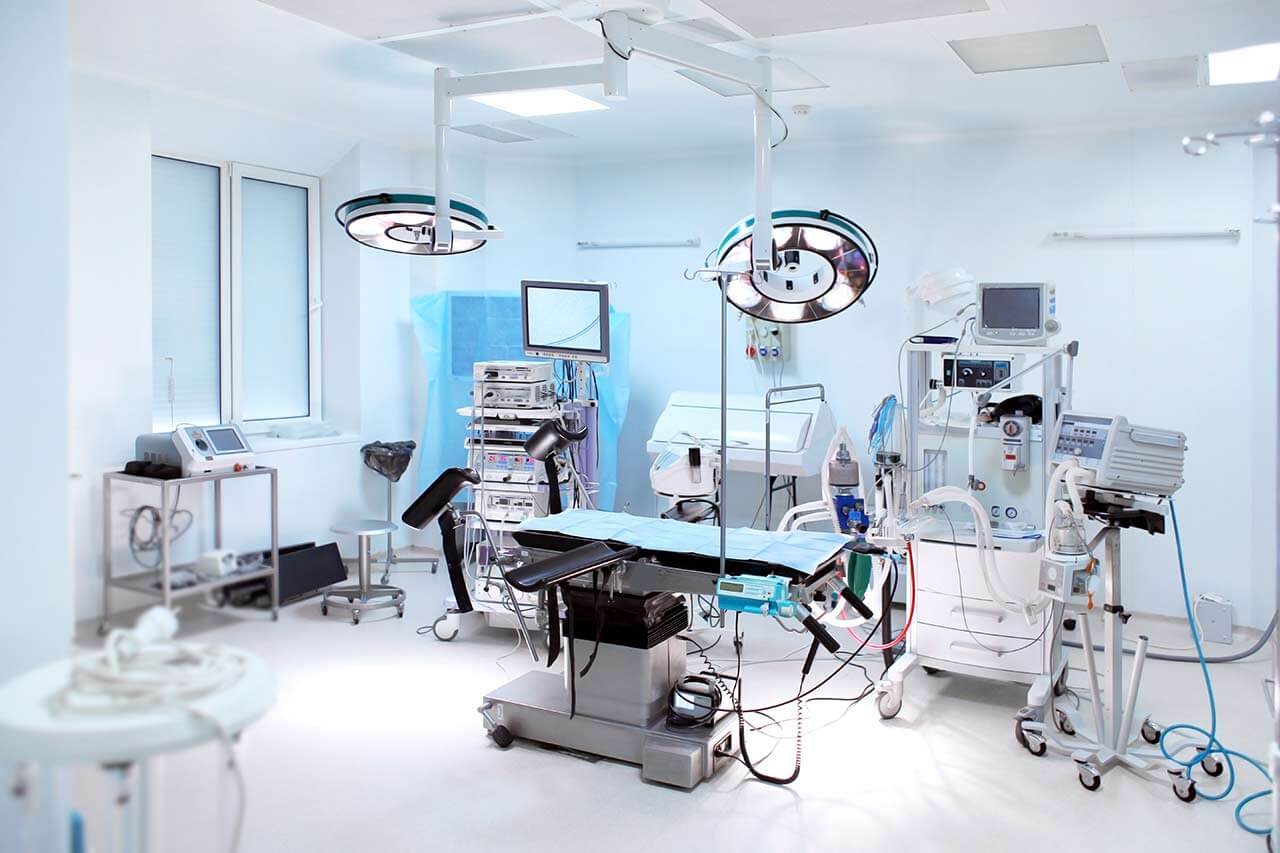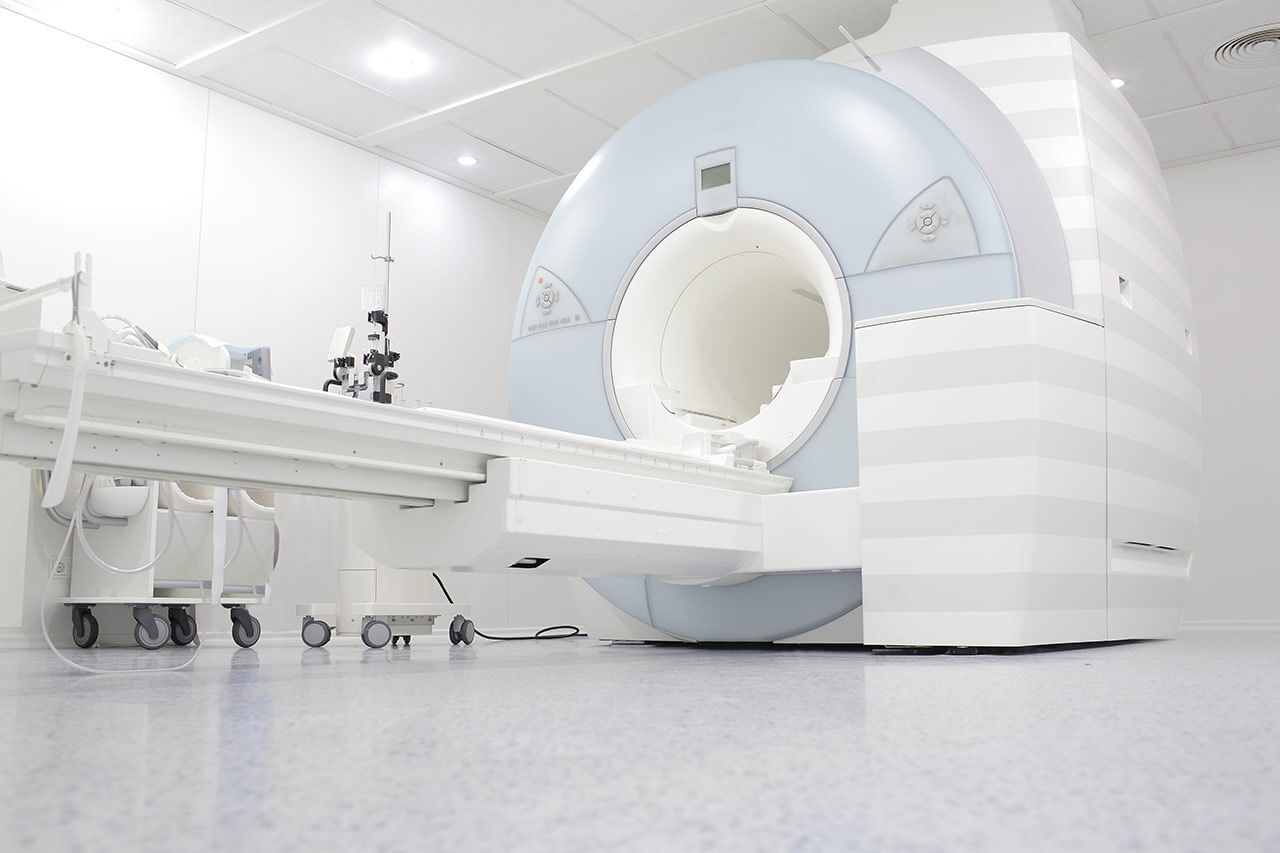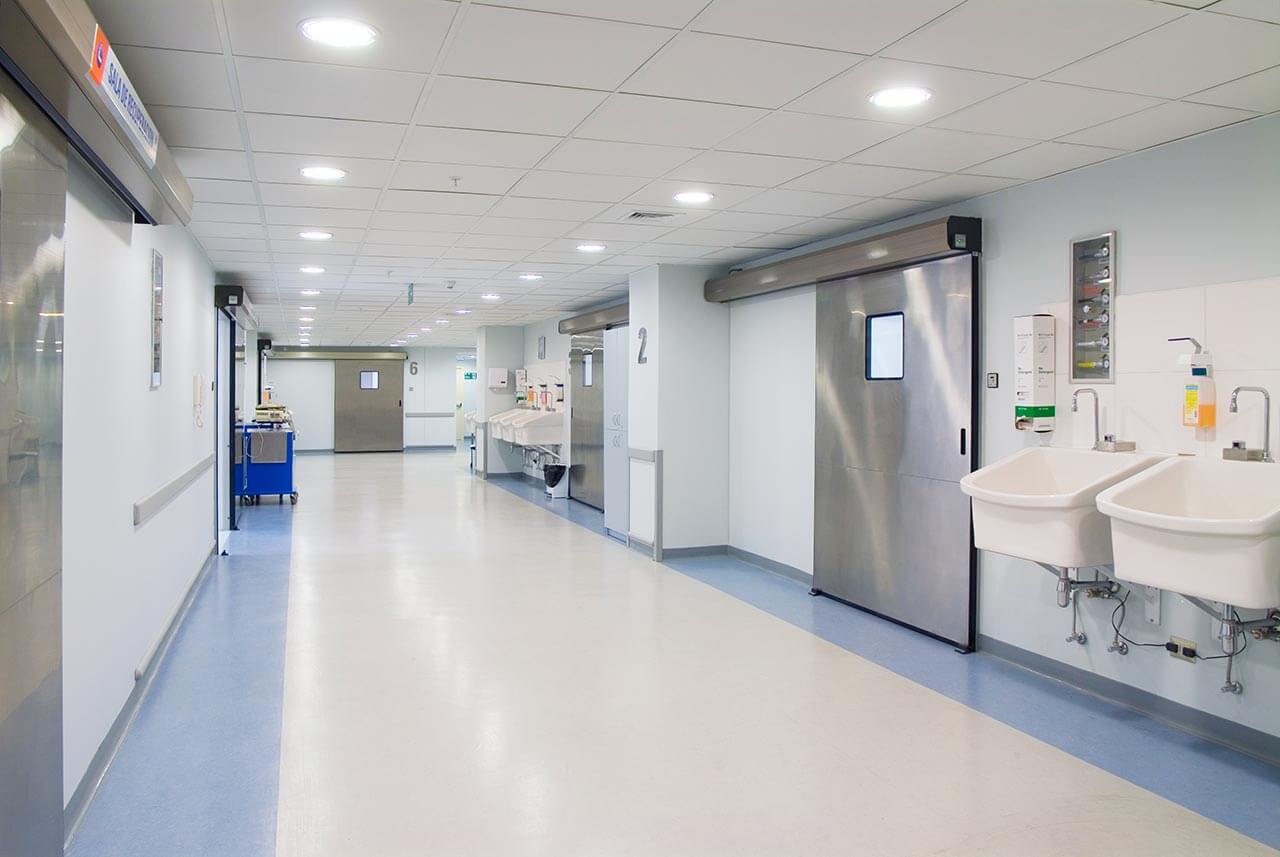
The program includes:
- Initial presentation in the clinic
- clinical history taking
- physical examination
- review of medical records
- laboratory tests:
- complete blood count
- general urine analysis
- biochemical blood analysis
- tumor markers
- indicators of inflammation
- indicators of blood coagulation
- CT/MRI
- ultrasound/ X-ray examination
- conduct endo-sonography of bronchi
- bronchoscopy with biopsy of bronchi and lungs
- histological/ cytological research
- nursing services
- consultation of related specialists
- consultation of the chief physician and all leading experts
- development of individual treatment plan
Required documents
- Medical records
- MRI/CT scan (not older than 3 months)
- Biopsy results (if available)
Service
You may also book:
 BookingHealth Price from:
BookingHealth Price from:
About the department
The Department of Pediatric Cardiology, Pulmonology, Allergology and Gastroenterology at the University Hospital Halle (Saale) offers a full range of medical services in its areas of specialization. The department provides medical care for newborns, young children, and adolescents with diseases of the cardiovascular system, lungs and airways, allergic diseases, and gastrointestinal pathologies. The medical facility has an advanced diagnostic base for comprehensive examinations. The department's specialists have exceptional experience and knowledge necessary for comprehensive and effective treatment of young patients. Children can receive both inpatient and outpatient medical care in the department. During the therapeutic process, reliable methods with proven effectiveness are used. If clinically indicated, endoscopic examinations and treatment procedures can be performed. Before starting the treatment, the doctors conduct an individual consultation with the child and the parents, during which they explain in detail the features of the course of therapy and the expected results. The department's medical team works in strict accordance with current clinical protocols and the recommendations of the German Society for Pediatric and Adolescent Medicine (DGKJ). The Head Physician of the department is Prof. Dr. med. Roland Haase.
Cardiology deals with the diagnosis and treatment of congenital and acquired, acute and chronic diseases of the heart and blood vessels in newborns, children, and adolescents. The department's physicians work closely with specialists in internal medicine, radiology, genetics, cardiac surgery, etc. Adults with congenital heart defects are treated in a specialized center that is part of the department. The physicians in the department often see young patients with atrial septal defects, atrioventricular canal defects, patent foramen ovale, coarctation of the aorta, congenital mitral valve defects, Ebstein's anomaly, Kawasaki disease, tetralogy of Fallot, and transposition of the great vessels. When a heart defect is suspected, laboratory tests, chest X-ray, electrocardiography, echocardiography, and cardiac catheterization are performed. As for the treatment, drug therapy is used whenever possible, which may include the use of ACE inhibitors, diuretics, beta blockers, and other medications. The second-line treatment includes catheter-based interventional procedures, while in complex clinical situations surgical intervention is recommended.
The team of pediatric pulmonologists treats infants, children, and adolescents with congenital and acquired, acute and chronic diseases of the airways and lungs. To assess the anatomical structure and function of the respiratory system, the department performs spirometry, body plethysmography, rigid and flexible bronchoscopy, and other examinations. Special attention is paid to early diagnosis and treatment of cystic fibrosis. This disease is very common. Although it is caused by a defect in a single gene, the clinical manifestations are quite diverse, causing damage to the airways, lungs, and digestive tract. Cystic fibrosis is incurable, so therapeutic efforts are aimed at improving the child's quality of life. The specialized Center for Cystic Fibrosis, which is part of the department, currently cares for about 50 children and 50 adults with this pathology.
An important clinical focus of the department is pediatric allergology. The medical facility diagnoses and treats various allergic diseases, such as allergic bronchial asthma, food allergies, drug allergies, allergic rhinitis, etc. Various effective methods are used to treat allergic reactions in children, including inhalations and allergen-specific immunotherapy (ASIT).
The department's therapeutic offer is complemented by a wide range of services in pediatric gastroenterology. The team of doctors in this field specializes in providing medical care to young patients with celiac disease, gastritis, gastroesophageal reflux disease, chronic constipation, chronic inflammatory bowel disease, pancreatitis, and liver pathologies. The department's pediatric gastroenterologists successfully perform endoscopic examinations and therapeutic procedures, the most popular of which are gastroscopy, colonoscopy, polypectomy, bougienage, and endoscopic removal of foreign bodies from the digestive organs.
The department's key clinical activities include the following:
- Cardiology
- Diagnostics and treatment of congenital and acquired heart defects
- Diagnostics and treatment of atrial septal defect
- Diagnostics and treatment of atrioventricular canal defect
- Diagnostics and treatment of patent foramen ovale
- Diagnostics and treatment of coarctation of the aorta
- Diagnostics and treatment of congenital mitral valve defects
- Diagnostics and treatment of Ebstein's anomaly
- Diagnostics and treatment of Kawasaki disease
- Diagnostics and treatment of tetralogy of Fallot
- Diagnostics and treatment of transposition of the great vessels
- Diagnostics and treatment of congenital and acquired heart defects
- Pulmonology
- Diagnostics and treatment of lung and airway diseases
- Diagnostics and treatment of bronchial asthma
- Diagnostics and treatment of bronchopulmonary dysplasia
- Diagnostics and treatment of cystic fibrosis
- Diagnostics and treatment of primary ciliary dyskinesia
- Diagnostics and treatment of alpha-1 antitrypsin deficiency
- Diagnostics and treatment of laryngomalacia
- Diagnostics and treatment of tracheomalacia
- Diagnostics and treatment of recurrent bronchitis
- Diagnostics and treatment of recurrent pneumonia
- Diagnostics and treatment of tuberculosis
- Diagnostics and treatment of exogenous allergic alveolitis
- Diagnostics and treatment of lung and airway diseases
- Allergology
- Diagnostics and treatment of allergic diseases
- Diagnostics and treatment of allergic bronchial asthma
- Diagnostics and treatment of allergic rhinitis
- Diagnostics and treatment of oral allergy syndrome
- Diagnostics and treatment of atopic dermatitis
- Diagnostics and treatment of insect venom allergy
- Diagnostics and treatment of food allergies
- Diagnostics and treatment of drug allergies
- Diagnostics and treatment of urticaria
- Diagnostics and treatment of allergic diseases
- Gastroenterology
- Diagnostics and treatment of gastrointestinal and liver diseases
- Diagnostics and treatment of chronic abdominal pain
- Diagnostics and treatment of chronic constipation
- Diagnostics and treatment of celiac disease
- Diagnostics and treatment of gastritis
- Diagnostics and treatment of gastroesophageal reflux disease
- Diagnostics and treatment of eosinophilic esophagitis
- Diagnostics and treatment of carbohydrate malabsorption
- Diagnostics and treatment of chronic inflammatory bowel disease
- Diagnostics and treatment of short bowel syndrome
- Diagnostics and treatment of pancreatitis
- Diagnostics and treatment of exocrine pancreatic insufficiency
- Diagnostics and treatment of liver diseases: hepatitis, primary sclerosing cholangitis, Wilson's disease, and chronic liver failure
- Diagnostics and treatment of gastrointestinal and liver diseases
- Other medical services
The range of therapeutic services provided by the department includes the following:
- Drug therapy
- Allergen-specific immunotherapy
- Inhalation therapy
- Catheter-based interventional procedures on the heart
- Endoscopic procedures for the treatment of gastrointestinal diseases
- Gastroscopy
- Colonoscopy
- Polypectomy
- Bougienage
- Removal of foreign bodies from the gastrointestinal tract
- Percutaneous endoscopic gastrostomy
- Endoscopic procedures for the treatment of respiratory diseases
- Flexible and rigid bronchoscopy (on an inpatient basis)
- Other therapeutic options
Curriculum vitae
Prof. Dr. med. Roland Haase has been the Head Physician of the Department of Pediatric Cardiology, Pulmonology, Allergology and Gastroenterology at the University Hospital Halle (Saale) since 1 April 2023 and is also W3 Professor for Pediatrics with a focus on Cardiology and Intensive Care at the Martin Luther University Halle-Wittenberg.
Prof. Haase studied medicine at the Free University of Berlin and the Charité and received his doctorate in 2000. In 2014, he defended his PhD thesis on the importance of pediatric intensive care in the treatment of children with cancer and received his Venia legendi in Pediatric and Adolescent Medicine. Since 2019, he has been working as the Head Physician of the Department of Neonatology and Pediatric Intensive Care at the St. Elisabeth Hospital Halle and the St. Barbara Hospital Halle.
Photo of the doctor: (c) Universitätsklinikum Halle (Saale)
About hospital
According to the prestigious Focus magazine, the University Hospital Halle (Saale) is one of the best medical institutions in Germany!
The history of the hospital goes back more than 300 years, and during this time it has managed to gain an excellent reputation not only in Germany, but also throughout the world. The hospital positions itself as a specialized healthcare facility for the treatment of severe and rare diseases and injuries. The hospital provides medical care to patients of all ages in compliance with the latest scientific achievements. The hospital is distinguished by successful research activities, especially in the field of cardiovascular diseases and oncopathologies – the specialists in these areas have made significant contributions to the development of the very latest diagnostic methods and therapeutic approaches.
The University Hospital Halle (Saale) has 30 specialized departments representing almost all areas of modern medicine, as well as 17 narrowly focused institutes. About 35,000 patients receive qualified medical care of European standards in the hospital every year, and more than 212,000 patients are served on an outpatient basis. This number of patients is evidence of the high efficiency of medical services and the excellent image of the hospital in the international medical arena; patients from all over the world regularly seek medical attention here.
Some of the hospital's structural units deserve special attention. For example, the Central Emergency Department (the largest in Saxony-Anhalt), modern dental clinics, the Perinatal Center, and the Transplant Center, which has a history of more than 40 years. The Transplant Center performs more than 40 kidney transplants annually, most of them from living donors.
Thanks to the use of the latest medical technologies and the availability of state-of-the-art equipment, many previously high-risk surgeries and procedures can now be performed in the hospital using sparing techniques. In this context, hybrid cardiac surgery and robotic surgery using the innovative da Vinci Si® system in urology are worthy of mention.
An integral part of the successful clinical practice of the University Hospital Halle (Saale) is the availability of experienced and competent medical staff. The total number of employees at the hospital is more than 4,450. Many physicians are known far beyond the borders of Germany: they regularly conduct important research that enables the development of modern medicine. In addition, the hospital specializes in training medical students, so qualified doctors and professors are willing to pass on their experience to the younger generation.
The hospital has many quality certificates such as DIN EN ISO 9001:2015 certificate, German Cancer Society (DKG) certificate, JACIE certificate, EndoCert certificate, ClarCert certificate, German Spine Society (DWG) certificate, German Trauma Society (DGU) certificate, CERT iQ certificate, LGA InterCetert certificate, and others.
Photo: (с) depositphotos
Accommodation in hospital
Patients rooms
The patients of the University Hospital Halle (Saale) stay in comfortable single, double, and triple rooms with a modern design. All patient rooms have an ensuite bathroom with a toilet and a shower. The standard patient room includes a comfortable automatically adjustable bed, a bedside table, a wardrobe, a table and chairs for receiving visitors, a TV, a radio, and a telephone. The patient rooms have access to Wi-Fi. For safety reasons, the use of laptops and cell phones is prohibited in some areas, including the intensive care units. The hospital also offers enhanced-comfort patient rooms.
Meals and Menus
The hospital offers delicious and well-balanced meals three times a day: breakfast, lunch, and dinner. Patients and their companions can choose from three daily menus, which always include dietary dishes. If necessary, an individual menu can be prepared for the patient. Children are offered a special menu with healthy and tasty dishes, rich in nutrients necessary for a growing body.
Further details
Standard rooms include:
![]() Toilet
Toilet
![]() Shower
Shower
![]() Wi-Fi
Wi-Fi
![]() TV
TV
Religion
Religious services are available upon request.
Accompanying person
Your accompanying person may stay with you in your patient room or at the hotel of your choice during the inpatient program.
Hotel
Your accompanying person may stay with you in your patient room or at the hotel of your choice during the inpatient program.




